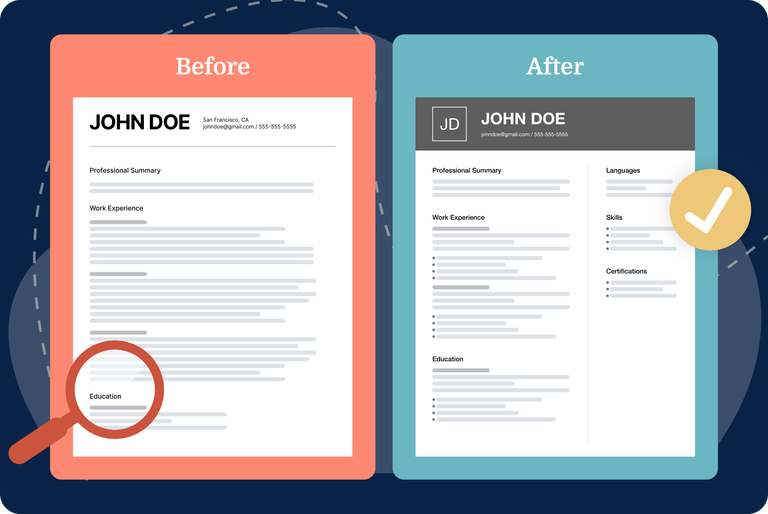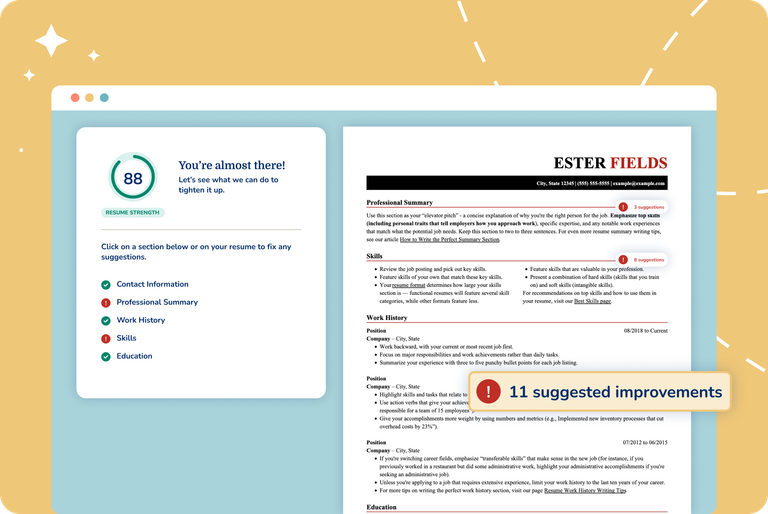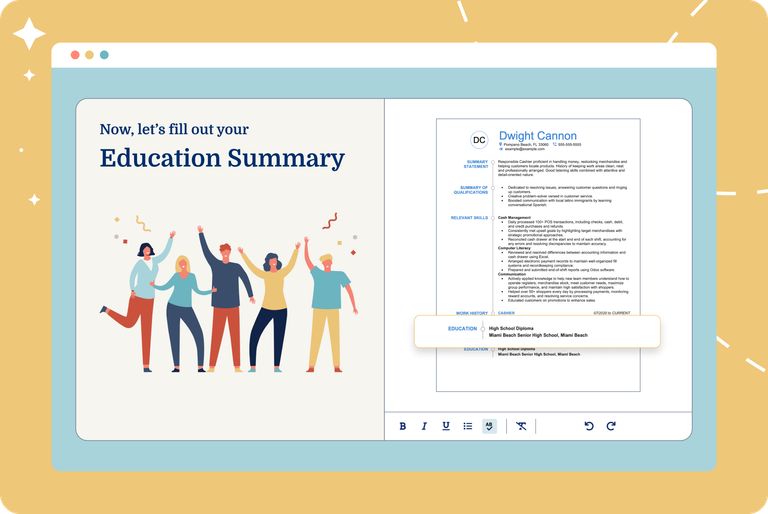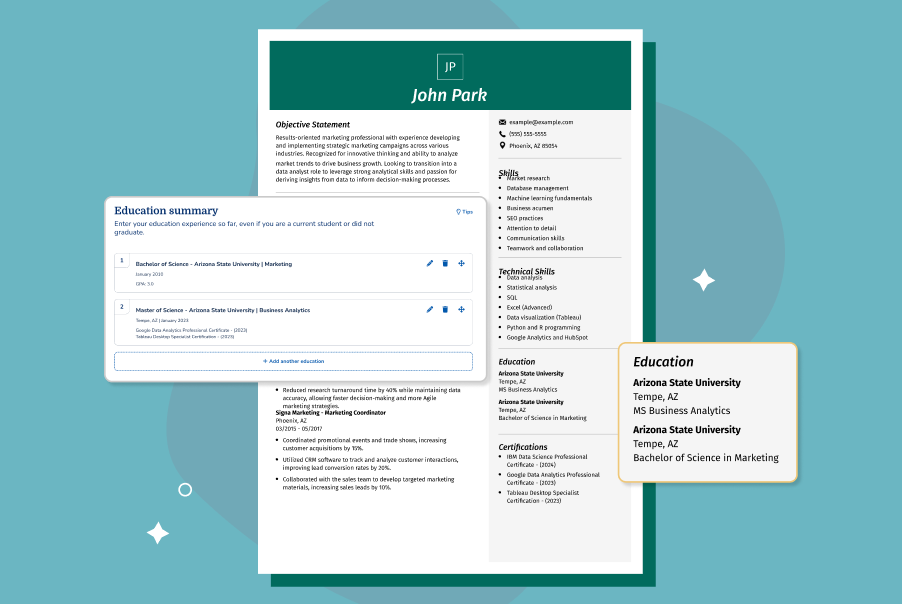Essential Data Analyst Skills for Your Resume

Our customers have been hired at: *Foot Note
AI Resume Skills Generator

What are data analyst skills?
Data analyst skills are essential for interpreting data trends, optimizing processes, and driving informed decision-making. These skills encompass abilities such as statistical analysis, data visualization, database management, and proficiency in programming languages. Strong data analyst skills enable efficient data-driven strategies and contribute to organizational success.
Explore our library of resume templates tailored to showcase data analyst skills effectively, or use this template as a starting point to create your own.
More data analyst resume examples
Examples of data analyst skills
We’ve curated a list of various skills used for data analysis tasks in the workplace. Highlight any of the skills below if they pertain to you and match the responsibilities of the job description.
Hard skills
Hard skills are specific, teachable abilities that can be defined and measured. Examples of hard data analyst skills include:
- Data storytelling
- Statistical analysis
- Presentation
- Project management
- Analytics
Soft skills
Soft skills are interpersonal qualities that complement technical abilities. Examples of soft data analyst skills include:
- Critical thinking
- Problem-solving
- Attention to detail
- Communication
- Collaboration
Computer skills
Computer skills are proficiency in tools and software used for data analysis. Examples of computer skills for analytics professionals include:
- Advanced Excel functions (pivot tables, macros)
- Statistical software (e.g., SPSS, SAS, R)
- Data visualization tools (e.g., Tableau, Power BI)
- SQL database querying
- Python or other programming languages for data manipulation
Technical skills
Technical skills involve specialized knowledge relevant to specific analytical tasks or industries.
Examples of technical skills for analysts include:
- Big data technologies
- Data warehousing
- Data mining
- Predictive analytics
- Quantitative research
Transferable skills
Transferable skills are versatile skills applicable across various roles and industries.
Examples of transferable skills for analysts include:
- Organizational skills
- Decision-making
- Research skills
- Learning agility
- Adaptability
How to highlight data analyst skills on your resume
- Analyze real-world case studies of successful data analysis projects for insights into effective analytical strategies and techniques.
- Pair up with a peer or colleague for mutual support, guidance, and encouragement in tackling complex data challenges.
- Enroll in data analytics courses or certification programs offered by professional organizations, such as Coursera, edX, or Udacity, to deepen your analytical skills and stay current with industry trends.
- Seek feedback from experts or mentors on your data analysis work to identify strengths and areas for improvement, and create a professional development plan to enhance your data analyst skills.
- Read research papers, industry reports, blogs, and articles, and listen to podcasts from leading data scientists and analysts to stay updated with the latest advancements in data analytics.
- Build relationships with other data analysts and professionals in your field through networking events, conferences, and online communities like LinkedIn groups or GitHub repositories. Exchange ideas, share experiences, and learn from others' successes and challenges.
- Volunteer for data-driven projects within your organization or community to gain hands-on experience and apply your analytical skills in practical settings.
- Utilize online platforms and resources like Kaggle, GitHub, and Stack Overflow to collaborate on data projects, solve problems, and expand your technical knowledge in data analytics.
- Participate in interactive workshops focused on specific data analysis techniques such as statistical modeling, data visualization, or machine learning. These workshops often provide hands-on exercises and simulations to practice skills in a safe environment.
- Practice your data analysis skills by engaging in real-world projects or Kaggle competitions and collaborating with peers and mentors to gain practical experience.
Common tools used by data analysts
Data analysts rely on a wide array of advanced tools and technologies to effectively process, analyze, and derive actionable insights from complex datasets. Here’s a list of essential tools crucial for their analytical work:
- Statistical software is used extensively for statistical analysis, data manipulation, and predictive modeling.
- Data visualization tools are essential for creating visually compelling dashboards and reports to communicate insights effectively.
- Database management systems (DBMS) enable analysts to store, manage, and retrieve structured and unstructured data efficiently using SQL queries.
- Extract, transform, load (ETL) tools facilitate the extraction, transformation, and loading of data into analytical databases or data warehouses.
- Programming languages are crucial for automating data workflows, handling large datasets, and implementing analytical algorithms.
- Big data tools are used for processing and analyzing large-scale datasets and streaming data in real time.
- Machine learning libraries enable data analysts to develop and deploy machine learning models for predictive analytics and pattern recognition tasks.
- Cloud services offer scalable storage, computing power, and data analytics services in the cloud, supporting flexible data analysis and collaboration.
- Text analytics tools analyze textual data sources, perform sentiment analysis, and extract valuable insights from unstructured data.
- Version control systems are essential for managing changes to code, scripts, and analytical workflows, ensuring collaboration and versioning control in analytical projects.
Best data analyst certifications
- Cloudera certification
- Microsoft Azure Certification
- Google Cloud Certification
- SAS Certification
- IBM Data Science on Coursera
Key takeaways
Let's review the key points from this article:
- Data analysts are crucial for organizational success, focusing on data interpretation, process optimization, and fostering data-driven strategies.
- Their responsibilities include data analysis, report generation, database management, and ensuring data quality and integrity across departments.
- Essential data analyst skills include statistical analysis, data visualization, database management, and proficiency in programming languages like SQL and Python.
- To stand out, emphasize your data management skills in your resume summary or objective, and detail quantifiable achievements rather than just listing responsibilities.
- Provide a mix of data analyst skills on your resume for the most impact.
- Data analysts use a variety of tools such as statistical software, data visualization tools, database management systems, and programming languages like SQL and Python.
- Relevant certifications from platforms like Cloudera, Microsoft Azure, and Google Cloud can enhance your credibility and data analyst skills.
FAQ
Why are data analyst skills important in today's job market?
Data analyst skills enable professionals to harness the power of data to solve complex problems, make strategic decisions, and drive organizational success. In a data-driven economy, these skills are in high demand across industries.
What are the differences between a data analyst and a data scientist?
While both roles involve working with data, data analysts typically focus on interpreting data to answer specific business questions and generate reports. On the other hand, data scientists often have more advanced skills in machine learning, predictive modeling, and algorithm development to uncover deeper insights and create data-driven solutions.
How can certifications in analytics benefit my career?
Certifications in analytics validate your expertise, enhance your credibility, and differentiate you from other candidates in competitive job markets. They demonstrate your commitment to continuous learning and proficiency in specialized analytics tools and techniques.
What should I include in my resume to showcase data analyst skills?
Include specific examples of projects where you applied analytics to achieve measurable results. Highlight relevant technical skills, software proficiency and analytics-related certifications or courses. Use quantifiable achievements to demonstrate the impact of your analytical abilities.
How can I demonstrate my analytical skills during a job interview?
During a job interview, demonstrate your analytical skills by discussing specific projects or scenarios where you analyzed data, identified trends, and made data-driven recommendations. Provide concrete examples of how your analytical insights contributed to achieving business objectives.
How can I highlight my data analyst skills in my cover letter?
To effectively highlight data analyst skills in your cover letter, focus on specific examples where you’ve utilized these skills to drive results. Describe projects or scenarios where you conducted data analysis, applied statistical techniques, or used data visualization tools to derive insights and make informed decisions.
Quantify your achievements whenever possible to demonstrate the impact of your analytical abilities. Tailor your examples to align with the job requirements and emphasize how your skills can contribute to solving the employer’s challenges or achieving their goals. This approach showcases your proficiency in analytics and illustrates your ability to add value to the organization through data-driven insights.
Our customers have been hired at:*Foot Note










